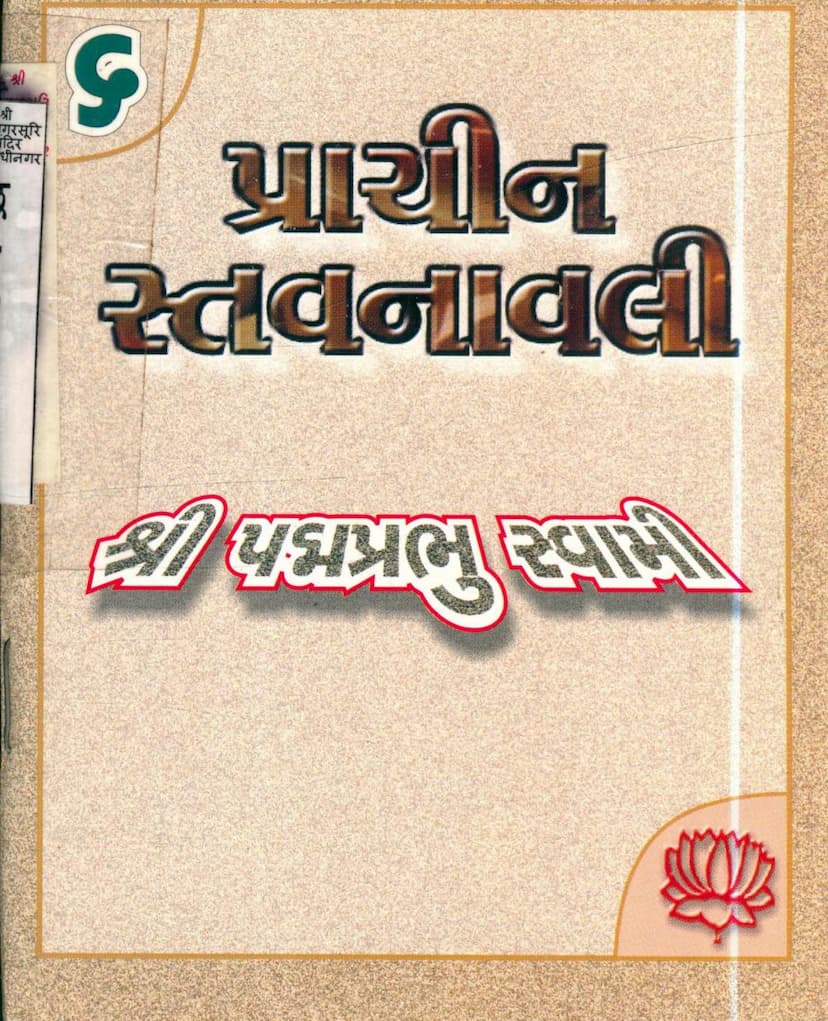Prachin Stavanavli 06 Padmaprabh Swami
Added to library: September 2, 2025

Summary
This document is the "Prachin Stavanavali 06 Padmaprabh Swami," a collection of devotional songs (stavan) dedicated to the sixth Tirthankara, Lord Padmaprabhuji. Compiled and published by Hasmukhbhai Chudgar, it is intended for private and personal use only.
Here's a comprehensive summary of its content:
Core Theme: The book is a compilation of ancient devotional hymns in Gujarati, primarily praising Lord Padmaprabhuji. The underlying theme is to foster deep devotion (bhakti) towards the Tirthankara as a means to achieve liberation (moksha). The text emphasizes the power of recognizing the true nature of the soul and the divine, leading to spiritual strength and inner joy.
Key Sections and Content:
- Title Page (Page 3): Clearly states the title, author/publisher, and the availability of the book.
- Foreword (Prastavik) (Page 4): This section, attributed to Jagachchandra Suri, highlights the importance of devotion to the "Paramatma" (Supreme Soul) for overcoming worldly suffering and attaining liberation. It mentions that the booklet includes available ancient stavanams of each Jinendra. The compiler's intention is to provide a taste of the devotion experienced by the composers of these hymns, hoping it will help readers awaken their inner spiritual strength and move closer to moksha.
- Introduction (Prabhat) (Page 5): This section, by Acharya Vijay Ramsurishwarji Maharaj Saheb, discusses why people might not experience joy despite worshipping the Lord daily. It suggests the reason lies in not truly understanding the Paramatma. It emphasizes that genuine devotion, even with a few tears shed in love, is more valuable than worldly sorrows and brings one closer to liberation.
- Table of Contents (Anukramanika) (Pages 6-8): This extensive table lists the various stavanams included in the book, along with their respective authors. It showcases a wide range of composers, many of whom are prominent Jain monks and scholars from different lineages (gachhas). This highlights the rich tradition of Jain devotional literature.
- Chaitra Vandana Vidhi (Jain Rituals for Worship) (Pages 9-14):
- This section details the correct recitation of specific Jain mantras and prayers used during worship ceremonies (Chaitya Vandan).
- It includes the meaning and purpose of important mantras like:
- Ichhami Khama Saman: For seeking forgiveness.
- Ir y avahiyam Sutra: For purifying oneself from unintended harm to living beings while moving.
- Tassa Uttari Sutra: For further purification of remaining sins.
- Annath Sutra: For the Kausarg (meditative posture) and its rules.
- Logassa Sutra: A prayer praising all 24 Tirthankaras.
- Jinkinch Sutra: For paying respects to Jinbimbas (images of Tirthankaras) in all three worlds.
- Namukkunna Sutra: Describing the virtues of the Arihants.
- Javanti Cheiaai Sutra: For paying respects to Jin pratimas (images) in all three worlds.
- Javanta Kevi Sahu Sutra: For paying respects to all Jain monks and nuns.
- Namo siddhacharya upadhyaya sarvasadhubhyah: Salutations to the Panch Parmeshthis.
- Jay Virayara Sutra: A prayer for blessings and success.
- Arihant Cheiaanu Sutra: For paying respects to all the Tirthankara images in the place of worship.
- It also provides instructions on how to perform the rituals, including gestures and when to stand or sit.
- Stavanams (Devotional Songs) (Pages 15-66):
- This is the core of the book, containing numerous stavanams composed by various revered Acharyas and Munis.
- Each stavan praises Lord Padmaprabhuji, highlighting His divine qualities, life events (birth, renunciation, enlightenment, nirvana), His physical attributes (color, height, symbol), His parents (King Dhar and Queen Susima), and His teachings.
- The stavanams are often set to different musical Ragas (e.g., Maru Sindhu, Alahiyali, Dhol Maru) and styles, indicating their performance tradition.
- The authors of these stavanams are prominently mentioned, showcasing the lineage and contributions of various Jain scholars like Shri Veervijayji, Shri Anandghanji, Shri Yashovijayji, Shri Bhanvijayji, Shri Nyaysagarji, Shri Padmavijayji, and many others.
- The lyrical content often delves into philosophical aspects of Jainism, such as karma, attachment, detachment, and the path to liberation.
- Thaya (Short Verses/Biographical Accounts) (Pages 66-67):
- These are brief biographical verses related to Lord Padmaprabhuji, providing key details about His life.
- One is attributed to Shri Virvijayji and another to Shri Padmavyijji.
- Concluding Inspirational Quote (Page 68): A powerful message from Acharya Shri Bhuvanbhanusurishwarji Maharaj Saheb emphasizing the importance of gratitude to the Tirthankaras, the significance of devotion as a "reservation" for future lives in Jainism, and the meditative state of oneness with the divine as a great yoga.
Key Information about Lord Padmaprabhuji (as presented in the book):
- Sixth Tirthankara.
- Symbol: Lotus (Padma).
- Parents: King Dhar (Shreedhar) and Queen Susima.
- Birthplace: Kausambi (Koshambi).
- Birth Auspiciousness (Kalyanak): Chaitra Sud 15 (Kevel Gyana), Kartik Vad 12 (Birth), Kartik Vad 13 (Diksha), Margashirsha Vad 11 (Moksha).
- Lifespan: 30 lakh purva.
- Height: 250 bows (dhanush).
- Complexion: Reddish (Rakta-Varna).
- Gana Dharas (Chief Disciples): 1000, first being Pradyot.
- Yaksh (Guardian Deity): Kusum.
- Yakshini (Guardian Deity): Shyama.
- Moksha (Liberation): From Sametshikhar.
Overall Significance: "Prachin Stavanavali 06 Padmaprabh Swami" is a valuable resource for Jains and scholars interested in Jain devotional literature. It preserves and presents ancient hymns that reflect a deep spiritual tradition, offering guidance on devotion, ethical conduct, and the path to spiritual realization. The compilation highlights the enduring impact of Lord Padmaprabhuji's teachings and the devotional fervor inspired by His life.